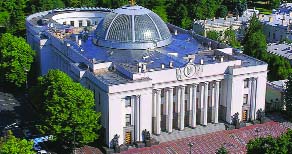
AFP, Kiev :Ukraine’s floundering economy needed $27 billion in global assistance when Petro Poroshenko won the presidency in May with a mandate to scrape out embedded corruption and slash reams of red tape.The battle-scarred leader faces Sunday’s general election with his Western allies digging in their pockets for another $19 billion (15 billion euros) aimed at keeping the ex-Soviet country together and out of Russia’s reach. The five months in between saw a pro-Kremlin revolt incapacitate Ukraine’s eastern industrial heartland and a billion dollars bleed out of the state budget in support of the demoralising war. “The conflict is not only hurting manufacturers based in the war zone but also those outside the region that are part of the same production chain,” Kiev’s Concorde Capital investment house analyst Oleksandr Parashchiy said.Economists think the fate of Ukraine’s recovery hangs on the outcome of a snap parliamentary ballot in which nationalists who reject Poroshenko’s cautious bid to rebuild trust with Russia represent a potent force.The president’s Petro Poroshenko Bloc hopes to forge a moderate coalition that will focus on an economic post-war revival meant to integrate the nation of 45 million into Europe after decades of mismanagement and waste.New York’s Morgan Stanley called Ukraine’s growth prospects “critically dependent” on turning a shaky ceasefire into a permanent political settlement in the Russian-speaking rustbelt.And the IMF said more fighting would force Kiev to push back debts onto future generations in order to free up funds needed for rebuilding and healing the ire of the hundreds of thousands displaced by war.The failure by leaders to follow the post-Communist lead of neighbours such as Poland and quickly remove artificial state support for loss-making enterprises has hounded Ukraine since long before the uprising.International Monetary Fund data show Ukraine’s economy to have grown by precisely 0.050 percent between 1993 and the end of last year-the worst performance of any eastern European state.But the effects of guerrilla warfare across lands that had driven Ukraine’s growth since the 19th century have sent the recession-prone system into a near free fall. The economy could shrink by as much as 10 percent in 2014.Finance Minister Oleksandr Shlapak said the shuttered coal mines and steel mills brought in nearly a third of Ukraine’s foreign currency earnings last year.The resulting shortage of dollars and euros has seen annual inflation rates approach 20 percent-more than double that in sanctions-hit Russia. The suffering Ukranian hryvnia is down nearly 40 percent against the US greenback early January.People have responded by taking more than $8.1 billion out of their bank deposits and trying to convert them into increasingly scarce foreign currencies still available at cash exchanges. Economists warn that further hryvnia declines will put out of reach the cost of repaying dollar-denominated state debt — $3.0 billion of it bought by Moscow to reward then-president Viktor Yanukovych’s fateful decision to ditch a landmark EU pact. But the new leaders’ signing of that same EU agreement-and the Russian economic sanctions on a range of food products that followed-have managed to transform Ukraine in ways successive governments had failed for more than two decades.EU statistics show Ukranian exports growing by a quarter to $2.9 billion in the first two months of Poroshenko’s presidency compared with the same period last year. Sales to Russia had dropped by 23 percent to $2.0 billion-a direct consequence of Moscow’s growing trade restrictions list.Economists think this switch will ultimately force firms to gear their operations to a more efficient and demanding EU market whose gross domestic product was more than eight times larger than Russia’s in 2013. They also note that output in more agrarian central and western regions have not been hurt as badly and are thus more primed for a recovery.

